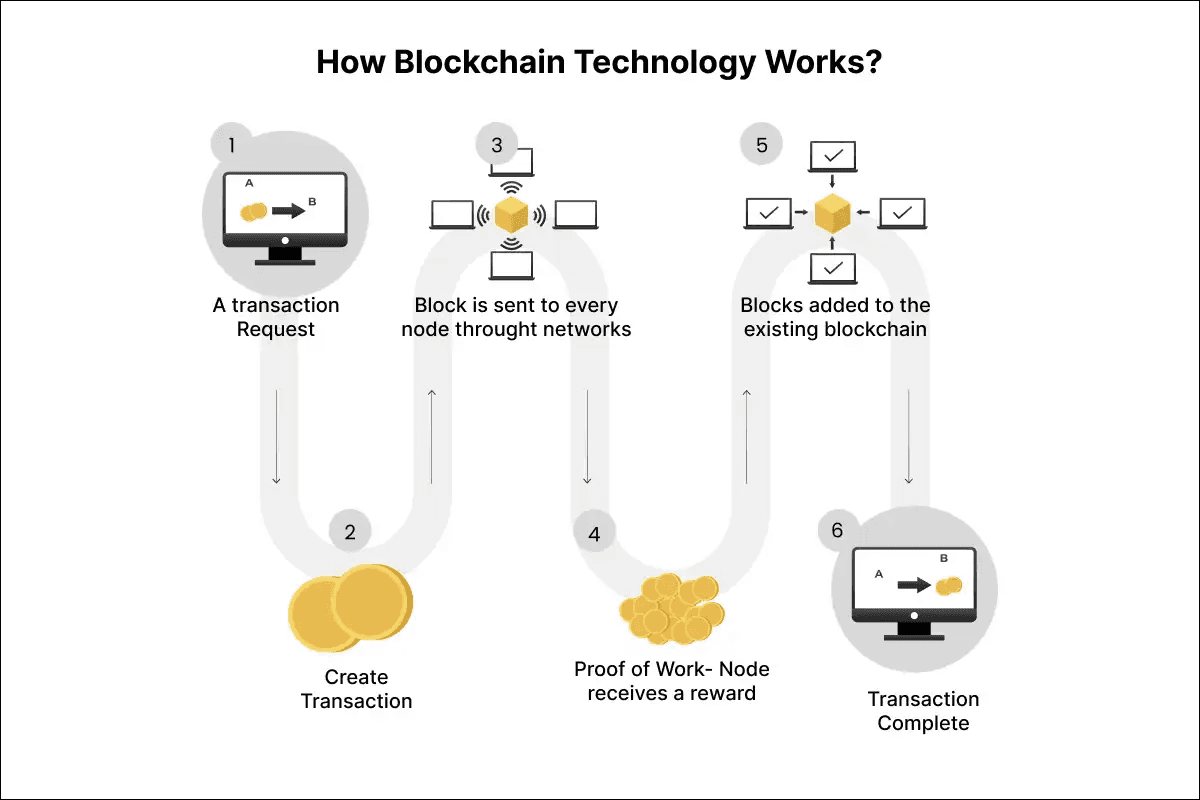Blockchain Technology: How Does It Work?
May 14, 2024



Blockchain technology is an innovative innovation with the potential to revolutionize industries globally. It is a steady and transparent gadget that allows decentralized and distributed ledger transactions without intermediaries. By using cryptographic techniques and consensus algorithms, blockchain technology enhances and improves the integrity and immutability of information, fostering acceptance as accurate among network members.
In recent years, blockchain development has gained vast traction, ordinarily because of its association with cryptocurrencies like Bitcoin and Ethereum. However, its programs extend beyond digital currencies, encompassing supply chain control, healthcare, finance, and more. The basics of blockchain generation and how it operates are important for maximizing its transformative potential and unlocking new possibilities in the digital age.
What Is Blockchain Technology?
Blockchain technology is a digital ledger shared among multiple users that allows for monitoring various tangible or intangible assets, such as goods and services, smart contracts, and more. It is regarded as actively utilizing cryptocurrency systems to stabilize and decentralize transaction statistics.
While all commercial enterprise endeavours require accurate statistics faster, blockchain technology can supply such facts immediately and extra transparently. The ledger is available to the most straightforward networked members who have permission, and each can have a cease-to-give-up view of all transaction information. This blend of protection, speed, and transparency makes blockchain a leveraging boon for agencies.
How Does Blockchain Technology Work?
The number one function distinguishing blockchain technology from other disbursed databases is the distribution and recording of facts on a peer-to-peer basis. So, while the process is finished, the dataset is unchangeable and, therefore, can't get corrupted. How does such a progressive method work?

Well, blockchains include specific digital applications referred to as scripts. These carry out the responsibilities of entering, saving, storing, and gaining access to information! As a blockchain is shipped, myriads of copies of the same dataset get generated on unique machines, which the permissible contributors have to fit to make it legitimate.
Blockchain collects and stores digital data in the form of virtual 'blocks,' which is a type of cellular spreadsheet. This block then gets brought to a prior 'chain' of blocks—hence the call 'blockchain'! Each block has its identification code known as the 'hash' and a time stamp showcasing when the networked participants established or mined the block! Herein, the blocks shall encompass the previous block's hash, once more forming the chain. They are encrypted, like other statistics.
Every time a block is introduced to the blockchain, the participant computers must update their copies, thereby establishing it as a secure device. In case of any necessary trade inside the former block, you must document that during a new block so that no one can ever rewrite a block's records. Whenever hackers intend to disrupt a current block, they must rewrite all copies on the various machines, which is nearly impossible!
What Are The Advantages of Blockchain Technology?
Similar to every other smart technology of the recent past, blockchain has a few hanging blessings, and they're as follows:

Blockchain technology abolishes the need for centralized 0.33-birthday celebration structures because of its peer-to-peer transaction provisions. It also enables the storage of a great deal of the costs.
Data recording is much more accurate in blockchain technology because human intervention is eliminated within the verification process.
The decentralization factor significantly reduces and nearly topples the scope of statistical tampering within the blockchain. Therefore, transactions can now be made more significant adequately, privately, and efficaciously.
Above all, blockchain technology is a first-rate banking or financial alternative. It's also an extraordinary mechanism for protecting your monetary data from the surveillance of an underdeveloped or risky government.
What Are The Disadvantages of Blockchain Technology?
Undoubtedly, with every boon comes a bane into the photo, and it's no distinct within the blockchain technology. Below are some of the disadvantages of blockchain technology:
The preliminary technology price associated with its setup is indeed high!
Blockchain technology is slower than a legacy device like a credit card or net banking. Alas, the transactions consistent with the second tend to be low.
Blockchain technology has sustainability issues. This technology requires a vast network of sturdy computers and significant power.
This technology has a history of illicit uses, like the dark internet.
Moreover, authorities and the government include daily updates and modifications of their laws and policies concerning blockchain technology. There are no general high-quality practices to comply with for blockchain, and it varies depending on the specific jurisdiction.
Conclusion
Blockchain technology is leading the way in technological innovation and offering solutions to longstanding challenges in data security, transparency, and trust. As organizations across various sectors recognize the potential of blockchain technology, investment in research, talent acquisition, and pilot projects continues to grow. Our company, DecentraBlock, is committed to pushing the boundaries of blockchain technology and driving meaningful change in the industry. From streamlining supply chain operations to enabling decentralized finance applications, DecentraBlock is dedicated to harnessing the transformative power of blockchain to create a more secure, efficient, and inclusive digital ecosystem.
Despite its transformative potential, blockchain development faces obstacles such as scalability, regulatory uncertainty, and high energy consumption. However, industry stakeholders, government agencies, and academic institutions work together to develop creative solutions and best practices. With DecentraBlock's commitment to responsible innovation and ethical considerations, blockchain development has the potential to revolutionize industries, empower individuals, and foster sustainable economic growth worldwide.
Blockchain technology is an innovative innovation with the potential to revolutionize industries globally. It is a steady and transparent gadget that allows decentralized and distributed ledger transactions without intermediaries. By using cryptographic techniques and consensus algorithms, blockchain technology enhances and improves the integrity and immutability of information, fostering acceptance as accurate among network members.
In recent years, blockchain development has gained vast traction, ordinarily because of its association with cryptocurrencies like Bitcoin and Ethereum. However, its programs extend beyond digital currencies, encompassing supply chain control, healthcare, finance, and more. The basics of blockchain generation and how it operates are important for maximizing its transformative potential and unlocking new possibilities in the digital age.
What Is Blockchain Technology?
Blockchain technology is a digital ledger shared among multiple users that allows for monitoring various tangible or intangible assets, such as goods and services, smart contracts, and more. It is regarded as actively utilizing cryptocurrency systems to stabilize and decentralize transaction statistics.
While all commercial enterprise endeavours require accurate statistics faster, blockchain technology can supply such facts immediately and extra transparently. The ledger is available to the most straightforward networked members who have permission, and each can have a cease-to-give-up view of all transaction information. This blend of protection, speed, and transparency makes blockchain a leveraging boon for agencies.
How Does Blockchain Technology Work?
The number one function distinguishing blockchain technology from other disbursed databases is the distribution and recording of facts on a peer-to-peer basis. So, while the process is finished, the dataset is unchangeable and, therefore, can't get corrupted. How does such a progressive method work?

Well, blockchains include specific digital applications referred to as scripts. These carry out the responsibilities of entering, saving, storing, and gaining access to information! As a blockchain is shipped, myriads of copies of the same dataset get generated on unique machines, which the permissible contributors have to fit to make it legitimate.
Blockchain collects and stores digital data in the form of virtual 'blocks,' which is a type of cellular spreadsheet. This block then gets brought to a prior 'chain' of blocks—hence the call 'blockchain'! Each block has its identification code known as the 'hash' and a time stamp showcasing when the networked participants established or mined the block! Herein, the blocks shall encompass the previous block's hash, once more forming the chain. They are encrypted, like other statistics.
Every time a block is introduced to the blockchain, the participant computers must update their copies, thereby establishing it as a secure device. In case of any necessary trade inside the former block, you must document that during a new block so that no one can ever rewrite a block's records. Whenever hackers intend to disrupt a current block, they must rewrite all copies on the various machines, which is nearly impossible!
What Are The Advantages of Blockchain Technology?
Similar to every other smart technology of the recent past, blockchain has a few hanging blessings, and they're as follows:

Blockchain technology abolishes the need for centralized 0.33-birthday celebration structures because of its peer-to-peer transaction provisions. It also enables the storage of a great deal of the costs.
Data recording is much more accurate in blockchain technology because human intervention is eliminated within the verification process.
The decentralization factor significantly reduces and nearly topples the scope of statistical tampering within the blockchain. Therefore, transactions can now be made more significant adequately, privately, and efficaciously.
Above all, blockchain technology is a first-rate banking or financial alternative. It's also an extraordinary mechanism for protecting your monetary data from the surveillance of an underdeveloped or risky government.
What Are The Disadvantages of Blockchain Technology?
Undoubtedly, with every boon comes a bane into the photo, and it's no distinct within the blockchain technology. Below are some of the disadvantages of blockchain technology:
The preliminary technology price associated with its setup is indeed high!
Blockchain technology is slower than a legacy device like a credit card or net banking. Alas, the transactions consistent with the second tend to be low.
Blockchain technology has sustainability issues. This technology requires a vast network of sturdy computers and significant power.
This technology has a history of illicit uses, like the dark internet.
Moreover, authorities and the government include daily updates and modifications of their laws and policies concerning blockchain technology. There are no general high-quality practices to comply with for blockchain, and it varies depending on the specific jurisdiction.
Conclusion
Blockchain technology is leading the way in technological innovation and offering solutions to longstanding challenges in data security, transparency, and trust. As organizations across various sectors recognize the potential of blockchain technology, investment in research, talent acquisition, and pilot projects continues to grow. Our company, DecentraBlock, is committed to pushing the boundaries of blockchain technology and driving meaningful change in the industry. From streamlining supply chain operations to enabling decentralized finance applications, DecentraBlock is dedicated to harnessing the transformative power of blockchain to create a more secure, efficient, and inclusive digital ecosystem.
Despite its transformative potential, blockchain development faces obstacles such as scalability, regulatory uncertainty, and high energy consumption. However, industry stakeholders, government agencies, and academic institutions work together to develop creative solutions and best practices. With DecentraBlock's commitment to responsible innovation and ethical considerations, blockchain development has the potential to revolutionize industries, empower individuals, and foster sustainable economic growth worldwide.
Blockchain technology is an innovative innovation with the potential to revolutionize industries globally. It is a steady and transparent gadget that allows decentralized and distributed ledger transactions without intermediaries. By using cryptographic techniques and consensus algorithms, blockchain technology enhances and improves the integrity and immutability of information, fostering acceptance as accurate among network members.
In recent years, blockchain development has gained vast traction, ordinarily because of its association with cryptocurrencies like Bitcoin and Ethereum. However, its programs extend beyond digital currencies, encompassing supply chain control, healthcare, finance, and more. The basics of blockchain generation and how it operates are important for maximizing its transformative potential and unlocking new possibilities in the digital age.
What Is Blockchain Technology?
Blockchain technology is a digital ledger shared among multiple users that allows for monitoring various tangible or intangible assets, such as goods and services, smart contracts, and more. It is regarded as actively utilizing cryptocurrency systems to stabilize and decentralize transaction statistics.
While all commercial enterprise endeavours require accurate statistics faster, blockchain technology can supply such facts immediately and extra transparently. The ledger is available to the most straightforward networked members who have permission, and each can have a cease-to-give-up view of all transaction information. This blend of protection, speed, and transparency makes blockchain a leveraging boon for agencies.
How Does Blockchain Technology Work?
The number one function distinguishing blockchain technology from other disbursed databases is the distribution and recording of facts on a peer-to-peer basis. So, while the process is finished, the dataset is unchangeable and, therefore, can't get corrupted. How does such a progressive method work?

Well, blockchains include specific digital applications referred to as scripts. These carry out the responsibilities of entering, saving, storing, and gaining access to information! As a blockchain is shipped, myriads of copies of the same dataset get generated on unique machines, which the permissible contributors have to fit to make it legitimate.
Blockchain collects and stores digital data in the form of virtual 'blocks,' which is a type of cellular spreadsheet. This block then gets brought to a prior 'chain' of blocks—hence the call 'blockchain'! Each block has its identification code known as the 'hash' and a time stamp showcasing when the networked participants established or mined the block! Herein, the blocks shall encompass the previous block's hash, once more forming the chain. They are encrypted, like other statistics.
Every time a block is introduced to the blockchain, the participant computers must update their copies, thereby establishing it as a secure device. In case of any necessary trade inside the former block, you must document that during a new block so that no one can ever rewrite a block's records. Whenever hackers intend to disrupt a current block, they must rewrite all copies on the various machines, which is nearly impossible!
What Are The Advantages of Blockchain Technology?
Similar to every other smart technology of the recent past, blockchain has a few hanging blessings, and they're as follows:

Blockchain technology abolishes the need for centralized 0.33-birthday celebration structures because of its peer-to-peer transaction provisions. It also enables the storage of a great deal of the costs.
Data recording is much more accurate in blockchain technology because human intervention is eliminated within the verification process.
The decentralization factor significantly reduces and nearly topples the scope of statistical tampering within the blockchain. Therefore, transactions can now be made more significant adequately, privately, and efficaciously.
Above all, blockchain technology is a first-rate banking or financial alternative. It's also an extraordinary mechanism for protecting your monetary data from the surveillance of an underdeveloped or risky government.
What Are The Disadvantages of Blockchain Technology?
Undoubtedly, with every boon comes a bane into the photo, and it's no distinct within the blockchain technology. Below are some of the disadvantages of blockchain technology:
The preliminary technology price associated with its setup is indeed high!
Blockchain technology is slower than a legacy device like a credit card or net banking. Alas, the transactions consistent with the second tend to be low.
Blockchain technology has sustainability issues. This technology requires a vast network of sturdy computers and significant power.
This technology has a history of illicit uses, like the dark internet.
Moreover, authorities and the government include daily updates and modifications of their laws and policies concerning blockchain technology. There are no general high-quality practices to comply with for blockchain, and it varies depending on the specific jurisdiction.
Conclusion
Blockchain technology is leading the way in technological innovation and offering solutions to longstanding challenges in data security, transparency, and trust. As organizations across various sectors recognize the potential of blockchain technology, investment in research, talent acquisition, and pilot projects continues to grow. Our company, DecentraBlock, is committed to pushing the boundaries of blockchain technology and driving meaningful change in the industry. From streamlining supply chain operations to enabling decentralized finance applications, DecentraBlock is dedicated to harnessing the transformative power of blockchain to create a more secure, efficient, and inclusive digital ecosystem.
Despite its transformative potential, blockchain development faces obstacles such as scalability, regulatory uncertainty, and high energy consumption. However, industry stakeholders, government agencies, and academic institutions work together to develop creative solutions and best practices. With DecentraBlock's commitment to responsible innovation and ethical considerations, blockchain development has the potential to revolutionize industries, empower individuals, and foster sustainable economic growth worldwide.

DecentraBlock is at the forefront of blockchain innovation, revolutionizing how businesses secure, transact, and grow in the digital age. Join us on a journey to harness the full potential of decentralized technology for a more efficient and transparent future.
Services
Subscribe to Our Newsletter
Get the latest news, updates, and insights on blockchain technology directly to your inbox. Sign up for our newsletter today!
© 2024 DecentraBlock. All rights reserved.

DecentraBlock is at the forefront of blockchain innovation, revolutionizing how businesses secure, transact, and grow in the digital age. Join us on a journey to harness the full potential of decentralized technology for a more efficient and transparent future.
Services
Subscribe to Our Newsletter
Get the latest news, updates, and insights on blockchain technology directly to your inbox. Sign up for our newsletter today!
© 2024 DecentraBlock. All rights reserved.

DecentraBlock is at the forefront of blockchain innovation, revolutionizing how businesses secure, transact, and grow in the digital age. Join us on a journey to harness the full potential of decentralized technology for a more efficient and transparent future.
Services
Subscribe to Our Newsletter
Get the latest news, updates, and insights on blockchain technology directly to your inbox. Sign up for our newsletter today!
© 2024 DecentraBlock. All rights reserved.


